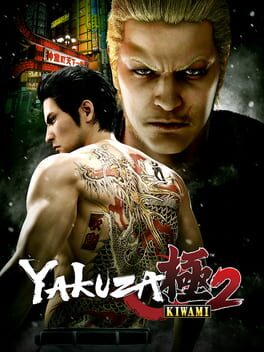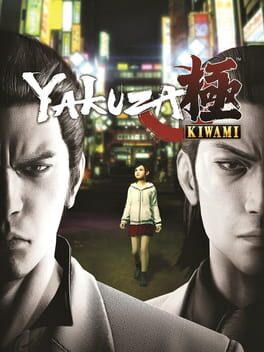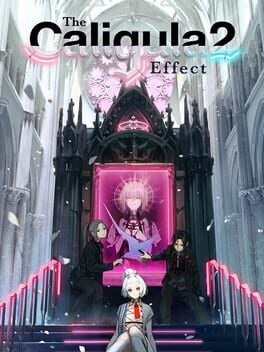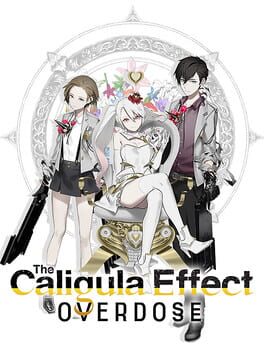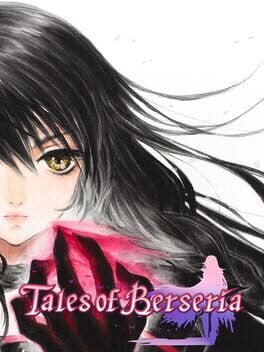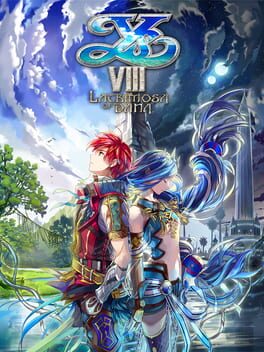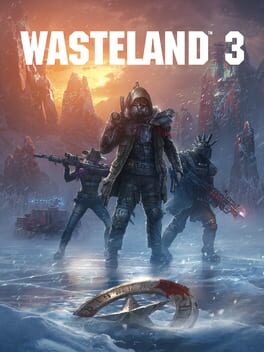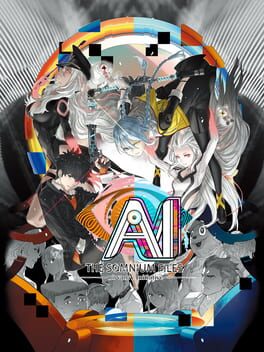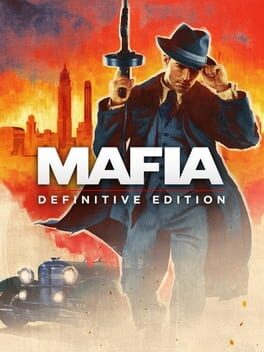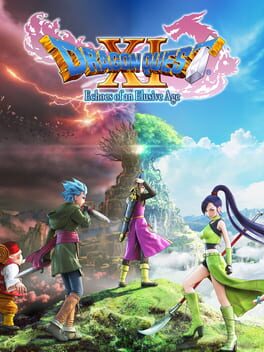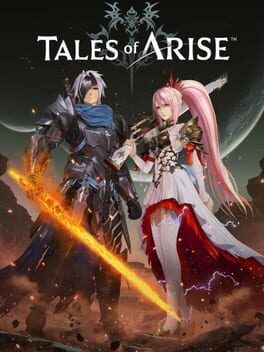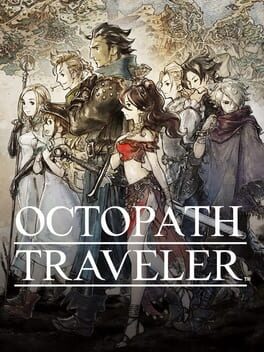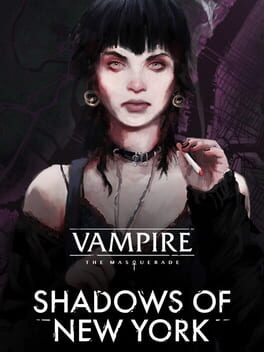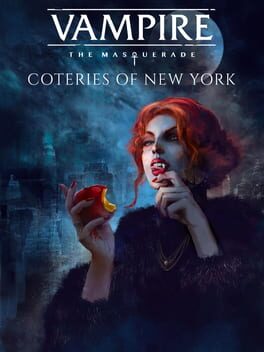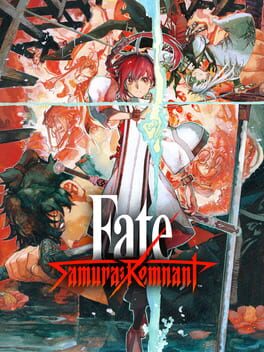yukiyukeyy
2017
A decent story albeit with more than a few problems. One big issue is that the latter half of the game is full of cheap and predictable plot twists. Additionally, the finale is terribly written and executed, making the ending very unsatisfying. I wish the game would stop trying to shove its lackluster main story arc and instead focus on Ryuji and Kiryu’s rivalry. Another big pain point was the use of extraneous drama and random conspiracies which really detracts from the main conflict.
Kaoru as a love interest was also a big letdown. She initially feels independent and strong but becomes a token damsel in distress once she’s introduced as a love interest. As mentioned before, Ryuji also felt way too absent in the story. His motivations are simple and flaky, which wouldn't have been a problem if the writers had explored or created the main story arc revolving around him more. Regardless, the few times we do experience the clash between the two dragons, it was great.
Overall, a step up from the previous Yakuza game and honestly a decent soap opera—not great but not terrible either.
Kaoru as a love interest was also a big letdown. She initially feels independent and strong but becomes a token damsel in distress once she’s introduced as a love interest. As mentioned before, Ryuji also felt way too absent in the story. His motivations are simple and flaky, which wouldn't have been a problem if the writers had explored or created the main story arc revolving around him more. Regardless, the few times we do experience the clash between the two dragons, it was great.
Overall, a step up from the previous Yakuza game and honestly a decent soap opera—not great but not terrible either.
2016
Mediocre to bad at best with PS2 era story writing, for better or worse. To start off with the good, I actually do like the idea and some of the execution in the writing of Nishiki, assuming one has played through Yakuza 0. The theme of parenthood is also quite cool coming from a remake of a years-old game, but it felt quite unrealized. The message it is trying to convey doesn’t come off as strong or relevant as I hoped for. Between the main story and substories, the game balances comedy and serious aspects quite well, similar to the other games in the Yakuza franchise that I have played, so that's always a welcome change from other games.
Now onto the bad. Starting off with the main plot, I hated the way the story handles the romance plotline in this game. It just felt so tacky and added on as an afterthought. I'm a firm believer that for romance, you either subtly hint at it or you do your best to develop the love between two characters. This just felt like romance for the sake of moving the plot forward, ticking a box in the “soap opera” to-do list. Other than that, there was a bit too much filler in the main chapters which led to nothing of substance down the line.
In terms of characters, Nishiki in the story could have been something great. But somehow he is given the most absurd motivations, making him seem very abrupt and nonsensical even with a backstory provided. Honestly, I think they should have given him more screen time and let his personality and story develop more. The antagonist also seems so comically bad, with motives that are questionable and very shallow characterization.
In general, the story felt like a typical soap opera full of questionable romance sequences, cartoon villains, and just fillers to lengthen the series.
Now onto the bad. Starting off with the main plot, I hated the way the story handles the romance plotline in this game. It just felt so tacky and added on as an afterthought. I'm a firm believer that for romance, you either subtly hint at it or you do your best to develop the love between two characters. This just felt like romance for the sake of moving the plot forward, ticking a box in the “soap opera” to-do list. Other than that, there was a bit too much filler in the main chapters which led to nothing of substance down the line.
In terms of characters, Nishiki in the story could have been something great. But somehow he is given the most absurd motivations, making him seem very abrupt and nonsensical even with a backstory provided. Honestly, I think they should have given him more screen time and let his personality and story develop more. The antagonist also seems so comically bad, with motives that are questionable and very shallow characterization.
In general, the story felt like a typical soap opera full of questionable romance sequences, cartoon villains, and just fillers to lengthen the series.
The game improves upon the first but not by much narratively. While the main story’s writing is tighter and better structured, it still retains the overall beats of the first game with somewhat better pacing which still is character driven.
Character-wise, I do feel the characters this time around are given more time to develop, and their energy bounces off each other quite well. Unfortunately, I just can’t seem to get into them much. Maybe it’s because I liked the ideas and intensity of the first game’s characters, and in this game, it just seems toned down in favor of more relatable characters. Additionally, I feel this relates to the overall feel of the story since a lot of the themes surrounding it are regrets and while the reason for them being there is their own personal regrets, the idea doesn’t really hook me since doesn’t everyone have regrets? Everyone has their own struggles, some worse than others and while storytelling and character development can make mundane stories interesting, in this case it falls rather flat.
The villains this time around also felt quite weak, moving from chapter to chapter without fully developing fully and exploring much more of their personalities. This might be because the previous game had the Overdose edition, which fleshed out the antagonists more.
There isn’t really much to say about the game. It still has some writing problems similar to the old game and I came out of it feeling sort of gimmicky like one of those isekai mangas who try to shake things up from the typical black-haired male protagonist.
Character-wise, I do feel the characters this time around are given more time to develop, and their energy bounces off each other quite well. Unfortunately, I just can’t seem to get into them much. Maybe it’s because I liked the ideas and intensity of the first game’s characters, and in this game, it just seems toned down in favor of more relatable characters. Additionally, I feel this relates to the overall feel of the story since a lot of the themes surrounding it are regrets and while the reason for them being there is their own personal regrets, the idea doesn’t really hook me since doesn’t everyone have regrets? Everyone has their own struggles, some worse than others and while storytelling and character development can make mundane stories interesting, in this case it falls rather flat.
The villains this time around also felt quite weak, moving from chapter to chapter without fully developing fully and exploring much more of their personalities. This might be because the previous game had the Overdose edition, which fleshed out the antagonists more.
There isn’t really much to say about the game. It still has some writing problems similar to the old game and I came out of it feeling sort of gimmicky like one of those isekai mangas who try to shake things up from the typical black-haired male protagonist.
Good ideas, terrible execution in every regard narratively. Let’s start with what it's good at. The characters are flawed and seem quite real as the game shows the ugly side of the characters and tackles heavy and taboo emotions and topics. Additionally, the characters' problems don’t get magically solved by the power of friendship but by facing their fears and trauma, revealing the worst parts of themselves. The villains are also quite sympathetic and receive their own scenarios, which help flesh them out. Portraying the characters' ugly sides and the refusal to shy away from heavy topics was refreshing.
Now, what do I mean by terrible execution? The main story itself is kinda bad, but it shows some promise with the characters. It felt like the main story was just an excuse for the writers to delve into the character stories. Each of the stories tackles heavy themes but does so to a less than sufficient degree. The themes are often more tell than show. By the end of my playthrough, it felt like I was reading a case study of various psychological profiles instead of relating or feeling something for the characters. The quality of these scenarios ranges from “wow” to downright abysmal, with more scenarios being mediocre to bad than impressive. This leads to the characters being a mixed bag. The inconsistency in writing between character episodes and between the characters themselves is a major issue.
That leads to my biggest problem: the characters are by no means generic or tropey, but they do feel unimpactful. In a character-driven game such as this, it really undermines the entire story.
Honestly, props to the writing team for giving it a go, but I do not recommend the game as there are other media out there that can be more entertaining and informative regarding psychology.
Now, what do I mean by terrible execution? The main story itself is kinda bad, but it shows some promise with the characters. It felt like the main story was just an excuse for the writers to delve into the character stories. Each of the stories tackles heavy themes but does so to a less than sufficient degree. The themes are often more tell than show. By the end of my playthrough, it felt like I was reading a case study of various psychological profiles instead of relating or feeling something for the characters. The quality of these scenarios ranges from “wow” to downright abysmal, with more scenarios being mediocre to bad than impressive. This leads to the characters being a mixed bag. The inconsistency in writing between character episodes and between the characters themselves is a major issue.
That leads to my biggest problem: the characters are by no means generic or tropey, but they do feel unimpactful. In a character-driven game such as this, it really undermines the entire story.
Honestly, props to the writing team for giving it a go, but I do not recommend the game as there are other media out there that can be more entertaining and informative regarding psychology.
2016
One thing I can say is that the main characters in this game are great, with the exception of one or two of the crew. Absolutely fantastic. The story, however, can be middling to less than great with weird and oftentimes terrible pacing. The first half is rather weak and feels railroaded, with the middle of the narrative losing steam before picking it up for the final half. Additionally, I was kind of let down by the ending.
But before all that, let's go back to talking about the characters. I like Velvet, our main protagonist. She is one of the better solo female video game protagonists I have seen. She initially seems one-note and tropey—edgy for the sake of being edgy, much like a genderbent version of those shounen manga side protagonists. But I am glad to say that her character evolves and explains beautifully over time. Her development and internal struggle are among the best aspects of the game. I appreciate that she isn’t the typical naive or overly cheerful female protagonist with “friendship can do everything” in her brain.
Moving on to the party members, they are easily the best part of the game—a rag-tag group of misfits with likable personalities and amazing interactions. Almost all, save one, are interesting and have individual side quests that strengthen the bond between the characters. They all have their flaws, which make them seem human. The group dynamic, with their interactions and skits, makes it very interesting to experience.
The story, as mentioned before, is something that I can’t say much of. It's pretty predictable and not that deep, but the protagonist adds a refreshing twist by being more violent and depressed rather than relying on the typical "power of friendship" trope—except at the few moments when it does happen, which just disappoints me. While the interactions or skits are really great, they are often layered four in a row and heavy with exposition. The character interactions make them bearable. One last thing: the villains' lack of depth negatively impacted the personal conflicts between them and the party members, which just makes it dull.
I would recommend this game honestly just for the characters. They are great and well-written, and I have no memory of it being tropey at all, which is one of my biggest gripes with JRPGs.
But before all that, let's go back to talking about the characters. I like Velvet, our main protagonist. She is one of the better solo female video game protagonists I have seen. She initially seems one-note and tropey—edgy for the sake of being edgy, much like a genderbent version of those shounen manga side protagonists. But I am glad to say that her character evolves and explains beautifully over time. Her development and internal struggle are among the best aspects of the game. I appreciate that she isn’t the typical naive or overly cheerful female protagonist with “friendship can do everything” in her brain.
Moving on to the party members, they are easily the best part of the game—a rag-tag group of misfits with likable personalities and amazing interactions. Almost all, save one, are interesting and have individual side quests that strengthen the bond between the characters. They all have their flaws, which make them seem human. The group dynamic, with their interactions and skits, makes it very interesting to experience.
The story, as mentioned before, is something that I can’t say much of. It's pretty predictable and not that deep, but the protagonist adds a refreshing twist by being more violent and depressed rather than relying on the typical "power of friendship" trope—except at the few moments when it does happen, which just disappoints me. While the interactions or skits are really great, they are often layered four in a row and heavy with exposition. The character interactions make them bearable. One last thing: the villains' lack of depth negatively impacted the personal conflicts between them and the party members, which just makes it dull.
I would recommend this game honestly just for the characters. They are great and well-written, and I have no memory of it being tropey at all, which is one of my biggest gripes with JRPGs.
As per usual, I was searching for some great JRPGs to play and came across Ys VIII, recommended to me by Steam. From the developers of the so-called best story series in JRPG, Trails, I picked this one as it is known for having one of the better stories in the series. I came out conflicted. It is a good story in the sense that it's interesting and engaging, which is a decent motivator and has its moments. But it’s not very compelling or particularly deep, meaning that it is quite simple.
The game’s story starts slow but picks up significantly in the latter half. Honestly, I do not mind this since I believe it can all be worth it if the payoff is good, and fortunately, it sort of is. While the narrative may initially seem simple and boilerplate for a JRPG, it gradually reveals some layers that make it unique and a bit deeper than other stories of the same category. The story itself isn't groundbreaking, but it manages to be enjoyable enough to keep you moving forward. For me personally, it came out pretty mixed—good enough to drag me forward but lacking the intrigue to truly push me toward something more.
Honestly, what kept me staying and motivated was Dana. She is a big reason why the story is as unique as it can be, and her interactions with the other cast are quite good. However, I couldn’t say the same for the other characters, with some of them being forgettable or very trope-heavy. Interactions between any characters other than Dana felt very mediocre or missed, with a high percentage of that being misses.
I feel the game took a small step in the right direction in terms of narrative and Dana as a character, but other than that, it goes along into the JRPG pile as tropey and sort of unengaging.
The game’s story starts slow but picks up significantly in the latter half. Honestly, I do not mind this since I believe it can all be worth it if the payoff is good, and fortunately, it sort of is. While the narrative may initially seem simple and boilerplate for a JRPG, it gradually reveals some layers that make it unique and a bit deeper than other stories of the same category. The story itself isn't groundbreaking, but it manages to be enjoyable enough to keep you moving forward. For me personally, it came out pretty mixed—good enough to drag me forward but lacking the intrigue to truly push me toward something more.
Honestly, what kept me staying and motivated was Dana. She is a big reason why the story is as unique as it can be, and her interactions with the other cast are quite good. However, I couldn’t say the same for the other characters, with some of them being forgettable or very trope-heavy. Interactions between any characters other than Dana felt very mediocre or missed, with a high percentage of that being misses.
I feel the game took a small step in the right direction in terms of narrative and Dana as a character, but other than that, it goes along into the JRPG pile as tropey and sort of unengaging.
2020
Wasteland 3 has been thoroughly recommended to me every time I ask for a recommendation for RPGs with a good story, so I got into it extremely excited. The game starts with an incredible opening that sets high expectations for the rest of the game. Unfortunately, the plot and storytelling fail to maintain this momentum. The storyline often feels immature and lacks subtlety. Maybe I was hoping for my mind to be blown away by the characters, overarching narrative, or plot twists. But no, I feel like the game heavily leans on absurdity as amusement. When you have one or two characters that are quirky or weird, they are memorable in themselves—an oddity, if you will—but if everyone is quirky or weird, then you are in a circus. Every character, from minor NPCs to major plot figures, behaves like clowns trying to outdo each other in banter or attention.
This over-the-top humor overshadows any potential for meaningful character development or emotional investment. The absurdity of situations and characters often feels forced, with the game relying too much on bizarre humor that doesn't always land. This focus on comedy detracts from the stakes of the story, making the wastelanders appear more concerned with petty antics than the dire circumstances of their world. This lack of serious, grounded characters makes it difficult to care about the events unfolding in the wasteland.
As mentioned before, the story starts with promise, featuring a "cliché" plot that could have been enjoyable if executed well. However, as the game progresses, the main story becomes forgettable, and the side stories feel pointless. Aside from companion quests, there are few side stories that capture interest or add depth to the narrative. With the constant barrage of jokes and absurdity, going from quest to quest feels like visiting the next patient in Arkham Asylum. As a result, the quests feel like mere excuses for delirium rather than meaningful adventures.
Not to mention the ending is a rushed mess that undermines the decisions made throughout the game. The game’s attempts to tie up the narrative quickly lead to a dissatisfying resolution that leaves much to be desired. I would recommend this game as a sort of palette cleanser for gritty, dark, and serious RPG stories, but other than that, I would not recommend it unless you enjoy the tone and atmosphere of it.
This over-the-top humor overshadows any potential for meaningful character development or emotional investment. The absurdity of situations and characters often feels forced, with the game relying too much on bizarre humor that doesn't always land. This focus on comedy detracts from the stakes of the story, making the wastelanders appear more concerned with petty antics than the dire circumstances of their world. This lack of serious, grounded characters makes it difficult to care about the events unfolding in the wasteland.
As mentioned before, the story starts with promise, featuring a "cliché" plot that could have been enjoyable if executed well. However, as the game progresses, the main story becomes forgettable, and the side stories feel pointless. Aside from companion quests, there are few side stories that capture interest or add depth to the narrative. With the constant barrage of jokes and absurdity, going from quest to quest feels like visiting the next patient in Arkham Asylum. As a result, the quests feel like mere excuses for delirium rather than meaningful adventures.
Not to mention the ending is a rushed mess that undermines the decisions made throughout the game. The game’s attempts to tie up the narrative quickly lead to a dissatisfying resolution that leaves much to be desired. I would recommend this game as a sort of palette cleanser for gritty, dark, and serious RPG stories, but other than that, I would not recommend it unless you enjoy the tone and atmosphere of it.
As the young kids would say, “let the man cook.” But in this case, the kitchen is on fire, and the food has turned to burnt charcoal. Mizuki being the protagonist in the sequel was a highly anticipated change narratively, as I personally liked her despite the weird anime tropes attached to her character. However, my excitement quickly turned to disappointment. As a standalone title, the game is messy narratively. It prioritizes surprising plot twists over coherent storytelling and character development. The game's attempts to be clever with its plot often fall flat, leading to a lack of cohesion in the overall narrative.
The biggest issue is its obsession with "The Big Reveal," sacrificing what could be satisfying character arcs and self-contained storylines. The writers tried to balance the inclusion of beloved characters from the first game while making the sequel accessible to new players. This resulted in a disjointed narrative where no character arcs or threads from the first game are meaningfully followed up. Returning characters are retconned or subjected to bizarre creative decisions.
Mizuki, who was a promising protagonist that I wanted to really enjoy, ends up being flat and boring. She lacks the depth and complexity expected of a lead character following up from the first game. The game does her a disservice by not exploring her character development adequately, which is mostly caused by poor writing and a lack of meaningful progression in her story. Her role feels diminished, and she comes across as a one-dimensional character. In the original game, Mizuki was a compelling supporting character, adding depth to the story with her interactions and backstory. However, she feels like a shell of her former self. The writers missed an opportunity to delve deeper into her psyche and growth, which is disappointing for fans who were excited to see her take the lead.
The returning cast from the first game also suffers from poor treatment. Major characters in the previous game who had significant development and interesting arcs are reduced to mere shadows of their former selves. Their roles are either minimized or altered in ways that don't align with their established personalities. This flanderization is frustrating, as it feels like the game is ignoring the progress these characters made in the first installment. The new characters introduced in the game are a mixed bag. While some show flashes of potential, most are unlikeable and fail to leave a lasting impression. The game tries to make these new characters integral to the plot, but their development feels rushed and shallow. The villains, in particular, are poorly written and lack depth, making the big reveals feel underwhelming.
Once again, a big reason for this is the game's fixation on plot twists. These twists often come at the expense of character development, making it hard to connect with the new faces. Relationships that should be crucial to the story are either glossed over or handled superficially. The focus on surprising the player detracts from the emotional depth and complexity that made the first game so engaging.
The problems from the first game that I had with too much innuendo and anime clichés are also exacerbated, which makes it seem like the writer doubled down way too much. Here’s my tinfoil hat theory: I feel that the writer worked backward, starting from the big reveal and smaller twists into the actual core narrative structures. This is a huge gamble because it can seem so disconnected, especially as a sequel with already established characters.
Go play the game if you feel you want a watered-down version of the original game.
The biggest issue is its obsession with "The Big Reveal," sacrificing what could be satisfying character arcs and self-contained storylines. The writers tried to balance the inclusion of beloved characters from the first game while making the sequel accessible to new players. This resulted in a disjointed narrative where no character arcs or threads from the first game are meaningfully followed up. Returning characters are retconned or subjected to bizarre creative decisions.
Mizuki, who was a promising protagonist that I wanted to really enjoy, ends up being flat and boring. She lacks the depth and complexity expected of a lead character following up from the first game. The game does her a disservice by not exploring her character development adequately, which is mostly caused by poor writing and a lack of meaningful progression in her story. Her role feels diminished, and she comes across as a one-dimensional character. In the original game, Mizuki was a compelling supporting character, adding depth to the story with her interactions and backstory. However, she feels like a shell of her former self. The writers missed an opportunity to delve deeper into her psyche and growth, which is disappointing for fans who were excited to see her take the lead.
The returning cast from the first game also suffers from poor treatment. Major characters in the previous game who had significant development and interesting arcs are reduced to mere shadows of their former selves. Their roles are either minimized or altered in ways that don't align with their established personalities. This flanderization is frustrating, as it feels like the game is ignoring the progress these characters made in the first installment. The new characters introduced in the game are a mixed bag. While some show flashes of potential, most are unlikeable and fail to leave a lasting impression. The game tries to make these new characters integral to the plot, but their development feels rushed and shallow. The villains, in particular, are poorly written and lack depth, making the big reveals feel underwhelming.
Once again, a big reason for this is the game's fixation on plot twists. These twists often come at the expense of character development, making it hard to connect with the new faces. Relationships that should be crucial to the story are either glossed over or handled superficially. The focus on surprising the player detracts from the emotional depth and complexity that made the first game so engaging.
The problems from the first game that I had with too much innuendo and anime clichés are also exacerbated, which makes it seem like the writer doubled down way too much. Here’s my tinfoil hat theory: I feel that the writer worked backward, starting from the big reveal and smaller twists into the actual core narrative structures. This is a huge gamble because it can seem so disconnected, especially as a sequel with already established characters.
Go play the game if you feel you want a watered-down version of the original game.
Average to less than average storytelling. Short, generic, and simple. While this isn't necessarily a bad thing, it makes for an okay experience. It's a very typical, cliched mafia narrative but engaging enough to keep you interested to move the plot along even though it can be predictable most of the times. However, the brevity of the story and the disorienting time skips were a bit off-putting at first. Over time, I got used to it, but I would have preferred a more linear storytelling approach with additional side stories to flesh out the characters even more. The story could have benefited from being longer, with more developed relationships between characters. It's not groundbreaking, especially if you've seen The Godfather or other named mafia themed TV series.
Characters range from decent to good. They fit the bill for a standard mafia story, and while they aren't particularly exceptional, they do a decent job of portraying their roles. Well crafted dialogue and voice acting helps sell the character the most more than anything. A positive that I liked was the gritty and a much more realistic nature of the criminal underworld compared to other games with these themes who tend to romanticize the lifestyle.
The narrative is decent enough but not innovative, and while the characters are okay-ish, the storytelling shines through with good dialogues and well-crafted cutscenes.
Characters range from decent to good. They fit the bill for a standard mafia story, and while they aren't particularly exceptional, they do a decent job of portraying their roles. Well crafted dialogue and voice acting helps sell the character the most more than anything. A positive that I liked was the gritty and a much more realistic nature of the criminal underworld compared to other games with these themes who tend to romanticize the lifestyle.
The narrative is decent enough but not innovative, and while the characters are okay-ish, the storytelling shines through with good dialogues and well-crafted cutscenes.
When I was first searching for some JRPGs to play, I was recommended Dragon Quest XI. People told me, “You have to try it, it’s really good!” Booting it up, I was excited. I had never played a Dragon Quest game before, but I knew how many copies it sold in Japan and that it's one of the foundations for modern JRPGs. Many games can trace their lineage to this very series. But oh boy, Dragon Quest XI just didn't hit the mark for me. It felt too simple and dull, making it hard to stay engaged or feel motivated to continue with the story.
The characters were pretty forgettable and seemed to fit every trope possible, with no substance beyond that. The mute protagonist was especially frustrating, which I normally don’t have a problem with. It seemed like he wanted to say something but couldn't, reducing him to a blank slate meant for your self-insert wishes, which didn't work for me.
The plot unfolds in a predictable manner: there's a bad dark lord doing bad things, and you need to stop him. The use of a traditional medieval fantasy setting didn’t help either to differentiate it from other JRPGs, whether modern or old. All in all, the plot felt standard, and whether it is comforting and safe or generic and cliche-ridden is up to the player to decide. What I can say is going to town, finding a problem, going out and fighting a monster, and then rinsing and repeating the process gets stale quite fast.
If you're looking for something with more depth and a bit more mature themes, this one might not be for you, so move along.
The characters were pretty forgettable and seemed to fit every trope possible, with no substance beyond that. The mute protagonist was especially frustrating, which I normally don’t have a problem with. It seemed like he wanted to say something but couldn't, reducing him to a blank slate meant for your self-insert wishes, which didn't work for me.
The plot unfolds in a predictable manner: there's a bad dark lord doing bad things, and you need to stop him. The use of a traditional medieval fantasy setting didn’t help either to differentiate it from other JRPGs, whether modern or old. All in all, the plot felt standard, and whether it is comforting and safe or generic and cliche-ridden is up to the player to decide. What I can say is going to town, finding a problem, going out and fighting a monster, and then rinsing and repeating the process gets stale quite fast.
If you're looking for something with more depth and a bit more mature themes, this one might not be for you, so move along.
2021
This was my first Tales game, and I was excited. The graphics looked good, and I was expecting an engaging story or at least a decent one, but most of all, I wanted to experience the great characterization the series is known for. Suffice to say, I didn’t find anything noteworthy.
The game attempts to deliver a grand overarching narrative only to trip by the rails and fall off the Empire State Building. The game’s premise, revolving around themes of slavery and racism, initially promises depth and complexity. However, this potential is squandered as these heavy themes are treated in a disappointingly superficial manner. Instead of delving into the harsh realities and moral complexities of these issues, the game reduces them to simple mistrust between groups and occasional, tame conflicts. This approach results in a narrative that, despite suggesting the possibility of more profound storytelling, remains primarily focused on being palatable and easily digestible, devoid of any real depth or rough edges.
The narrative structure follows a familiar pattern, where the first half of the game involves the protagonist embarking on a journey to free the world, only to evolve into a grander, but equally predictable plot. The story's beats and themes are presented in a very in-your-face manner, lacking subtlety or nuance. The treatment of the "racism bad" theme feels overused and shallow without taking any serious implications on the matter, akin to simplistic moral lessons found in low-quality webnovels. Initially, there are hints of more interesting and emotional elements, such as the characters' lives as slaves and their rebellion against oppressive rulers. However, as the story progresses, these elements are overshadowed by a focus on more generic and less engaging themes, such as uniting everyone through the power of love and friendship.
Where do I even begin with the characters, something I was hoping could carry the narrative quality and enjoyment of this game. Throughout the extensive runtime, it is challenging to form any emotional connection or care about the party members. The character development is minimal, and the interactions between them lack chemistry and depth. The skits, which are a staple of the Tales series and typically used to flesh out character relationships and personalities, are mostly expository. They focus on delivering background information and exposition about the game's geopolitical context rather than developing the characters' interpersonal dynamics. This problem is further exacerbated within the main narrative. Because the characters are bland and unengaging, the narrative itself suffers. The player's lack of investment in the characters makes it difficult to care about the events unfolding in the story. The protagonists and supporting cast are particularly forgettable, with personalities that are either one-note or poorly developed. The villains, too, are weakly portrayed, lacking presence and compelling motivations.
I wanted to like the game or at least give it a decent rating. The first half of the game was quite poor, but the second half made it even worse narratively. Combined with my expectation of high-quality character development and interactions, I would say if you are a fan of narrative, especially ones that are not too anime tropey, then stay away.
The game attempts to deliver a grand overarching narrative only to trip by the rails and fall off the Empire State Building. The game’s premise, revolving around themes of slavery and racism, initially promises depth and complexity. However, this potential is squandered as these heavy themes are treated in a disappointingly superficial manner. Instead of delving into the harsh realities and moral complexities of these issues, the game reduces them to simple mistrust between groups and occasional, tame conflicts. This approach results in a narrative that, despite suggesting the possibility of more profound storytelling, remains primarily focused on being palatable and easily digestible, devoid of any real depth or rough edges.
The narrative structure follows a familiar pattern, where the first half of the game involves the protagonist embarking on a journey to free the world, only to evolve into a grander, but equally predictable plot. The story's beats and themes are presented in a very in-your-face manner, lacking subtlety or nuance. The treatment of the "racism bad" theme feels overused and shallow without taking any serious implications on the matter, akin to simplistic moral lessons found in low-quality webnovels. Initially, there are hints of more interesting and emotional elements, such as the characters' lives as slaves and their rebellion against oppressive rulers. However, as the story progresses, these elements are overshadowed by a focus on more generic and less engaging themes, such as uniting everyone through the power of love and friendship.
Where do I even begin with the characters, something I was hoping could carry the narrative quality and enjoyment of this game. Throughout the extensive runtime, it is challenging to form any emotional connection or care about the party members. The character development is minimal, and the interactions between them lack chemistry and depth. The skits, which are a staple of the Tales series and typically used to flesh out character relationships and personalities, are mostly expository. They focus on delivering background information and exposition about the game's geopolitical context rather than developing the characters' interpersonal dynamics. This problem is further exacerbated within the main narrative. Because the characters are bland and unengaging, the narrative itself suffers. The player's lack of investment in the characters makes it difficult to care about the events unfolding in the story. The protagonists and supporting cast are particularly forgettable, with personalities that are either one-note or poorly developed. The villains, too, are weakly portrayed, lacking presence and compelling motivations.
I wanted to like the game or at least give it a decent rating. The first half of the game was quite poor, but the second half made it even worse narratively. Combined with my expectation of high-quality character development and interactions, I would say if you are a fan of narrative, especially ones that are not too anime tropey, then stay away.
2018
I do not like this game. To sum it up the experience feels like I am in Groundhog day forced to replay a terribly written prologue to a fantasy RPG but they replace the character each time loop.
The game presents you with eight characters, but none of them are particularly interesting, and they barely interact with each other. They feel like tropes and stereotypes of medieval western characters without much to differentiate them. Writing everything in such a self-contained manner, as if each adventurer has entirely set off on their own, does no favors too. It hinders potential interactions and makes everyone feel even more like blank slates and cardboard cutouts. Not to mention for me personally, there are no interesting themes or overall cohesion to the character’s journeys.
Each plot line also feels so damned terrible, they read like someone put up a board of ideas and started throwing darts blindfolded. And with eight of them, none of the individual plotlines have room to fully develop into an actually unique narrative. But I think the biggest problem of all is the pacing. As said in the beginning, each new character’s story starts generic and cliché, and you have to go through this eight times. This makes it such a drag, a long tedious and arduous drag for people who put a lot of points into narrative in a video game.
The game presents you with eight characters, but none of them are particularly interesting, and they barely interact with each other. They feel like tropes and stereotypes of medieval western characters without much to differentiate them. Writing everything in such a self-contained manner, as if each adventurer has entirely set off on their own, does no favors too. It hinders potential interactions and makes everyone feel even more like blank slates and cardboard cutouts. Not to mention for me personally, there are no interesting themes or overall cohesion to the character’s journeys.
Each plot line also feels so damned terrible, they read like someone put up a board of ideas and started throwing darts blindfolded. And with eight of them, none of the individual plotlines have room to fully develop into an actually unique narrative. But I think the biggest problem of all is the pacing. As said in the beginning, each new character’s story starts generic and cliché, and you have to go through this eight times. This makes it such a drag, a long tedious and arduous drag for people who put a lot of points into narrative in a video game.
Just like most Vampire the Masquerade media, the characters truly make up the majority heavy lifting. And in no exception, Julia stands out as the highlight of this game. Her brash, socially conscious nature and idealistic views, especially post-university, feel authentic. Having encountered people like Julia in the creative industry, her character resonated with me. She's not just a caricature of an angry, intelligent, and cynical individual; she’s a well-crafted protagonist with a unique voice that makes her feel real. If you can empathize with her, Julia becomes a significant positive, despite some disagreeing with her actions or finding her incomprehensible at times.
The narrative excellently showcases Julia’s personality, juxtaposed with her vampire compulsions and lingering humanity. Interacting with the intriguing side cast adds depth, making the experience rewarding. The atmospheric portrayal of her vampire clan, with all its peculiarities, complements her character perfectly. Her reactions to various events, framed by the game’s dark and brooding ambiance, are some of my favorite aspects.
The primary issue is its brevity. Just as I was fully engrossed in Julia’s world, the story ended, feeling more like a short story than a substantial visual novel similar to the first game. The potential for even more deeper exploration of modern New York and its vampiric politics is evident but underutilized with primarily its conclusion giving me a fulfilling dose of that seedy politics. Additionally, the side characters, many of whom are brought over from the first game, feel underdeveloped. The game assumes familiarity with these characters, leading to a sense of missed opportunity for new players or those needing a refresher. More fleshed-out side stories would have enriched the narrative significantly.
Julia’s character and the game’s atmospheric storytelling are commendable, but the experience is marred by its short length and underdeveloped side plots. It’s a good, short game to be a stepping stone into the World of Darkness that leaves you wishing for more—a longer main story and more comprehensive side stories with characters not so heavily tied to the first game.
The narrative excellently showcases Julia’s personality, juxtaposed with her vampire compulsions and lingering humanity. Interacting with the intriguing side cast adds depth, making the experience rewarding. The atmospheric portrayal of her vampire clan, with all its peculiarities, complements her character perfectly. Her reactions to various events, framed by the game’s dark and brooding ambiance, are some of my favorite aspects.
The primary issue is its brevity. Just as I was fully engrossed in Julia’s world, the story ended, feeling more like a short story than a substantial visual novel similar to the first game. The potential for even more deeper exploration of modern New York and its vampiric politics is evident but underutilized with primarily its conclusion giving me a fulfilling dose of that seedy politics. Additionally, the side characters, many of whom are brought over from the first game, feel underdeveloped. The game assumes familiarity with these characters, leading to a sense of missed opportunity for new players or those needing a refresher. More fleshed-out side stories would have enriched the narrative significantly.
Julia’s character and the game’s atmospheric storytelling are commendable, but the experience is marred by its short length and underdeveloped side plots. It’s a good, short game to be a stepping stone into the World of Darkness that leaves you wishing for more—a longer main story and more comprehensive side stories with characters not so heavily tied to the first game.
Much like the game, I assume this review won't be long. The game initially does a fantastic job of introducing a colorful cast of characters. These individuals aren't just diverse and quirky—they truly embody the spirit of New York City with backstories that beg you to dive deeper. Sadly, just as you get attached, these characters tend to disappear without much ceremony as the game progresses.
The real meat of the game, the main story, starts to heat up beautifully, making you think you're in for a thrilling adventure through vampire politics and dark city secrets. But just as things get interesting, the game cuts off abruptly. Once the main narrative wraps, that’s it—there’s no revisiting your allies or further exploring those intriguing side plots. Just when you’re ready to delve deeper into the relationships and the intrigue, the game slaps a big "nope" right across your expectations.
The idea of a created protagonist where your decisions should matter sounds fantastic in theory. However, in practice, it feels more like you’re just along for the ride rather than steering it. The result is a feeling of detachment from your character, as if you’re merely going through the motions without genuinely affecting the outcome or engaging deeply with the story.
The game tantalizes with its atmospheric New York setting and flashes of excellent character writing. However, don’t come expecting a fully fleshed-out story. The game is more a collection of captivating moments rather than a cohesive narrative experience. Play it for the atmosphere and the character sketches, not for a deep or impactful story.
The real meat of the game, the main story, starts to heat up beautifully, making you think you're in for a thrilling adventure through vampire politics and dark city secrets. But just as things get interesting, the game cuts off abruptly. Once the main narrative wraps, that’s it—there’s no revisiting your allies or further exploring those intriguing side plots. Just when you’re ready to delve deeper into the relationships and the intrigue, the game slaps a big "nope" right across your expectations.
The idea of a created protagonist where your decisions should matter sounds fantastic in theory. However, in practice, it feels more like you’re just along for the ride rather than steering it. The result is a feeling of detachment from your character, as if you’re merely going through the motions without genuinely affecting the outcome or engaging deeply with the story.
The game tantalizes with its atmospheric New York setting and flashes of excellent character writing. However, don’t come expecting a fully fleshed-out story. The game is more a collection of captivating moments rather than a cohesive narrative experience. Play it for the atmosphere and the character sketches, not for a deep or impactful story.
2023
Fate has always topped my list of favorite anime series, drawing me in with its clever mix of historical figures and rich, mythical backstories. So, you can imagine my excitement for a standalone game set in Edo Japan—a period brimming with intrigue and drama. Unfortunately, "Fate/Samurai Remnant" didn't quite hit the mark for me narratively.
The game trips up most notably with its protagonist, Iori. While he’s meant to be a central figure, Iori feels bland and static, especially when you compare him to Saber, who completely steals the spotlight. Saber’s evolution is the real draw here—she’s not only charismatic but shows significant growth, making every one of her scenes a treat. Iori, on the other hand, only starts to shine way too late—it’s like he finally shows up just as the party’s winding down, making it more awkward than impressive. While the masters each have fascinating backgrounds that could offer a deeper dive into Edo’s various societal roles—whether they’re a fierce warrior or a crafty tactician—this potential is largely unexplored. We only really get a good look at one master, leaving me craving that broader narrative exploration both historical and character depth wise. And while the servants do get some side stories, I wish the game would delve deeper into their individual tales and their interactions with the historical landscape of Edo Japan.
What makes the game occasionally sparkle is its master-servant dynamics, which echo the engaging essence of the Fate series. However, the overall narrative feels inconsistent, with many subplots that seem more like filler than compelling content. The game sets up some promising story threads that are either left unresolved or superficially tied off, leaving you with more questions than answers. There are moments where it delivers the complex character dynamics and historical depth we expect from Fate. Yet, these moments are sporadic and often drowned out by the overarching issues of shallow storytelling and uneven character development, particularly noticeable in the early to mid-game sections.
I think the game shows us a glimpse of what could be, a glimpse of brilliance, but it falls short of maintaining a gripping narrative or developing its characters evenly across the board. It’s like getting a beautifully wrapped gift that isn’t quite what you hoped for inside.
The game trips up most notably with its protagonist, Iori. While he’s meant to be a central figure, Iori feels bland and static, especially when you compare him to Saber, who completely steals the spotlight. Saber’s evolution is the real draw here—she’s not only charismatic but shows significant growth, making every one of her scenes a treat. Iori, on the other hand, only starts to shine way too late—it’s like he finally shows up just as the party’s winding down, making it more awkward than impressive. While the masters each have fascinating backgrounds that could offer a deeper dive into Edo’s various societal roles—whether they’re a fierce warrior or a crafty tactician—this potential is largely unexplored. We only really get a good look at one master, leaving me craving that broader narrative exploration both historical and character depth wise. And while the servants do get some side stories, I wish the game would delve deeper into their individual tales and their interactions with the historical landscape of Edo Japan.
What makes the game occasionally sparkle is its master-servant dynamics, which echo the engaging essence of the Fate series. However, the overall narrative feels inconsistent, with many subplots that seem more like filler than compelling content. The game sets up some promising story threads that are either left unresolved or superficially tied off, leaving you with more questions than answers. There are moments where it delivers the complex character dynamics and historical depth we expect from Fate. Yet, these moments are sporadic and often drowned out by the overarching issues of shallow storytelling and uneven character development, particularly noticeable in the early to mid-game sections.
I think the game shows us a glimpse of what could be, a glimpse of brilliance, but it falls short of maintaining a gripping narrative or developing its characters evenly across the board. It’s like getting a beautifully wrapped gift that isn’t quite what you hoped for inside.
